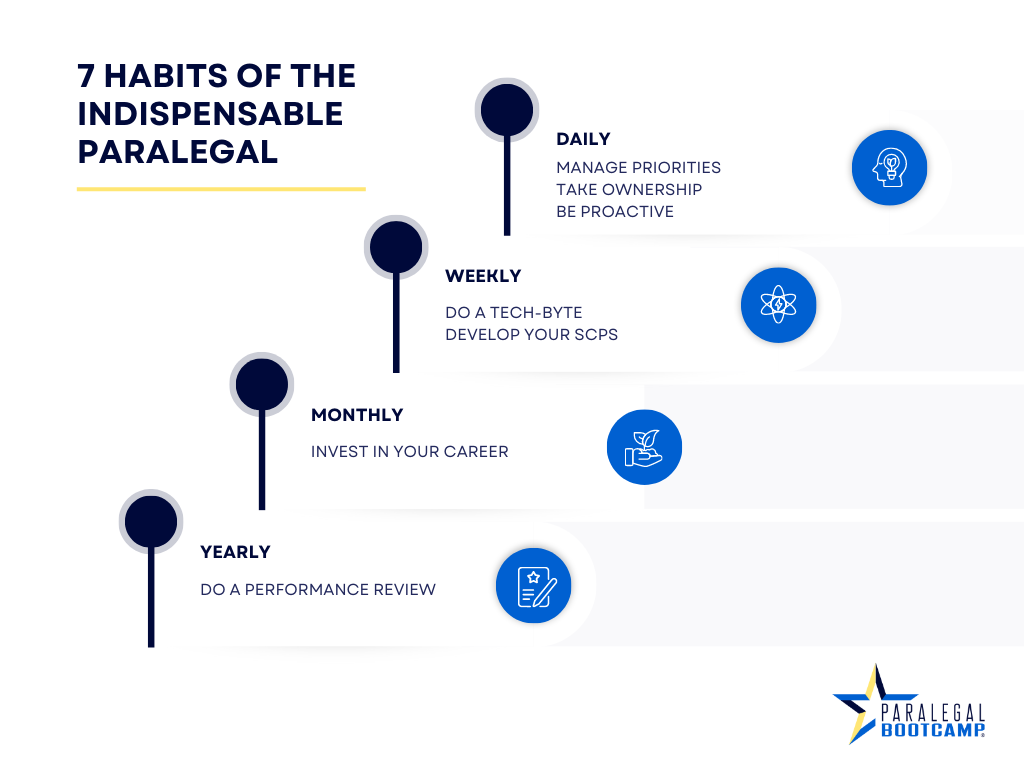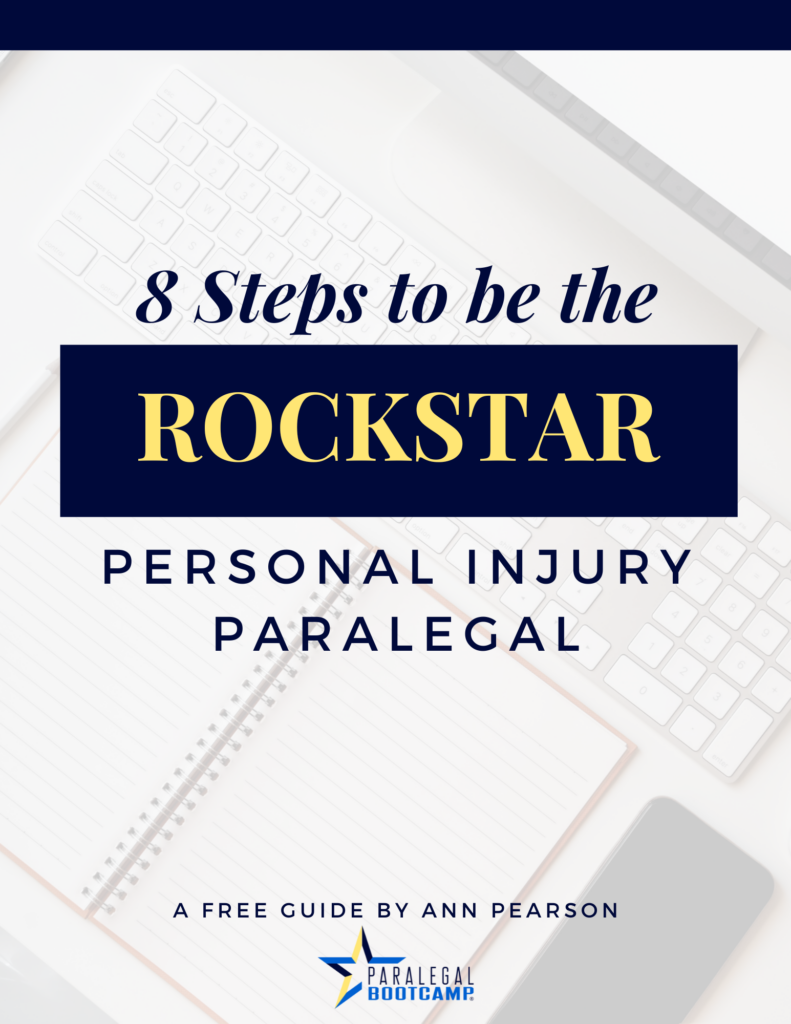What is an Indispensable Paralegal?
An indispensable paralegal is an essential member of the team.
It doesn’t mean that you are the only person on the team who knows where something is or how something is done. That doesn’t make someone indispensable. That just makes someone tired and stressed out from working long hours.
Listen to the podcast episode below!
Some of the words that attorneys use to describe their indispensable paralegal include:
My Rockstar Paralegal
My Superstar Paralegal
Our MVP
My Right-Hand Person
I want to clarify that what I’m going to be discussing are habits, not skills or traits. If you’re looking for the top paralegal skills or paralegal traits, I’ve written about those before on this blog.
What I want to talk about for this article are habits. Specifically, habits that you can develop if you want to be an indispensable paralegal.
Let’s start with…
Why Do You Want To Be An Indispensable Paralegal
We want to be an indispensable paralegal because that makes us an essential part of the team. What flows from being treated as a professional at that level could be:
Make more money.
Enjoy going to work.
Do work that is challenging and rewarding.
More job security.
I’ve divided these 7 habits into categories, depending on whether they should be daily habits, or things that you do on a weekly, monthly, or yearly basis to make it easy for you to get these habits into your professional life.
Here’s an overview of where we’re going:

Daily Habits
These are things that you should be doing consistently, every single day, in your paralegal career to be an indispensable paralegal.
I’ve put together a little Habit Tracker for you that you can download and it will make it an easy reminder for you on all of these habits.
Get a Copy of the Paralegal Boot Camp’s Habit Tracker to download and use to stay on track with your habits this year.
Habit 1: Be proactive
How do we define being “proactive” as a paralegal?
You could take some courses on mind-reading so that you know what the attorney is thinking. That would be a great paralegal skill to have.
I worked for an attorney back in the 90s who thought I could read his mind. He wrote that on my annual performance review: He wrote, “Ann knows what I need before I even know that I need it.”
How did I become the attorney’s mind-reader? I read every single thing that came in on his litigation cases.
By doing that, I knew there was a deposition next month that I could start preparing for this month. I knew there was a hearing in a few weeks that I could start preparing him for this week.
Key behaviors of a proactive paralegal
- Anticipatory: acting in advance of a future situation rather than just reacting.
- Change-oriented: taking control and causing something to change rather than adapting to a situation or waiting for something to happen.
- Self-initiated: the proactive individual does not need to be asked to act, nor do they require detailed instructions.
You can’t do all three of those things unless you put your eyes on everything that comes in on your client files. But then what do you do with that information?
I give a really good example of what a litigation paralegal can do what that information in my 3 Steps to Better Case Management. It’s a free download to get you started.
If you want to take a deeper dive into being a proactive litigation paralegal, you’ll definitely want to join me in the Litigation Paralegal Boot Camp because it is the only program of it’s kind that will help you become an indispensable paralegal if you are working in litigation.

Free Strategy Guidebook for
New Litigation Paralegals
Are you ready to fast-track your litigation paralegal career?!
Our free guidebook reveals three powerful strategies that will set you up for success in your journey. If you’re ready to seize this opportunity and thrive as a litigation paralegal, sign up below, and get started now!
Habit 2: Take ownership of your work
This is a big one from attorneys who tell me, “I like working with a paralegal who owns the project from start to finish. They don’t come to me with every hiccup that happens on that project. They own it. They solve the hiccups. They solve the problems and get the project done.”
Taking ownership is not just working on a project; it is not just receiving a task and completing that task as assigned; it means making it your mission to see the project through. You show that you’re willing to do what it takes to get the job done.
It also means that when you delegate a portion of a project, whether it is outsourced to a vendor or delegated to another team member, you still own the project, and you own the result of the project. So if something goes wrong with that portion of the project that you’ve delegated, you don’t blame the mistake on someone else.
Taking ownership is accepting responsibility for every aspect of the project, even if it means working outside your job description or putting in the extra effort. In other words, an indispensable paralegal never says, “that’s not my job.”
One skill that helps with this habit of taking ownership is the problem-solving skill. I went more in-depth into the problem-solving skill in this podcast episode.
Habit 3: Manage your priorities
When I say manage your priorities, what I mean is – manage your priorities, NOT your time.
There’s really no such thing as time management. Think about that. We all have the same 24 hours in a day. It’s not like managing your money and being able to increase what’s in your savings account.
It’s not like we can look at tomorrow’s 24 hours and say, “I’m going to be super efficient and manage my time so that 4 of those 24 hours can be put in my time bank so that I can use them on Thursday.
Unlike other professions, your deadlines are not flexible. As a paralegal, you can’t go to the judge and ask for an extra day to get that motion filed because you’ve got too many things on your plate. Your attorney can’t either. You can’t reschedule that big merger that’s scheduled for tomorrow just because you don’t have one of the closing documents ready.
Here’s something that can help you switch mindsets from managing your time, to managing your priorities.
Remember that it’s all about attention management if you want to manage your priorities. It’s what you are focusing your attention on during those work hours that matter the most.
That’s why one of our modules in the Billable Hour Boot Camp focuses entirely on how to improve productivity and get a better work-life balance.
If you work at a law firm, being more productive will also get you more billable hours.
But I’m not just talking about billable hours here. Your time is valuable. Regardless of where you work, whether you bill your time, or what practice area you work in.

Let’s say that you have 1,600 hours worth of work to do in a year, which would be typical for most paralegals. If you work in a law firm, that might be 1600 billable hours, but if you work in a corporate legal department, this could mean just the work you have to complete in a year. It doesn’t have to be billable. You still have cases and transactions, files to work on.
When you’re in the office working on those files 90% of the time, meaning 10% of the time, you’re doing other stuff like grabbing some coffee, chatting with coworkers about your weekend, checking social media, etc.
If you’re productive 90% of the time you’re in the office, you’re going to complete that work in 1,780 hours.
Compare that to the 2,135 hours it takes you to complete that same work if you’re working at 75% productivity. Meaning 25% of the time you’re in the office, and you’re not doing work on a client file.
THAT IS A DIFFERENCE OF 355 HOURS!
That’s a lot of hours! Imagine if you’re the paralegal working at 90% productivity. You’re getting out of the office in 355 fewer hours than the paralegal working at 75%.
That productive paralegal has a much better work-life balance. They’re not working weekends and holidays to make up for the work that didn’t get done. A paralegal with a good work-life balance has the bandwidth and energy levels to be an indispensable paralegal.
Imagine what you could do with 355 hours!
Read this: 3 Pro Tips for Paralegal “Time” Management
Weekly Habits

Habit 4: Do a tech byte
What is a tech byte? It is a technology check-up, looking at the technology that you use on a regular basis (or should be using!) and finding one small task or thing that you do inside that technology that you could get better or more proficient using it. It also involves keeping track of any emerging trends in technology that are specific to your practice area.
Let’s break those down a little bit.
For the technology that you are or should be using on a regular basis:
We’ll start with Microsoft Word, Excel, PowerPoint, Adobe, your case management software, or your firm’s document management system. In fact, I’d even include Microsoft Outlook in this category because there are so many capabilities inside our basic Microsoft.
Do you know enough to “get by” or are you an advanced user of the basic office technology applications?
In addition to those applications, during your weekly Tech Byte, consider the technology specific to your practice area that you’re using now or what’s coming your way soon. Be the person on your team who has the most knowledge about the technology that your team uses or should be using.
You want to be the “go-to” person when it comes to technology. You don’t want the senior partner on your team to go to the young associate down the hall to help use that new technology tool. You want them coming to you.
But don’t stop there. Once you master the technology that your team is currently using, you should always be on the lookout for trends in your practice area so that you know. You can make recommendations on other technology that could benefit the practice and how your files are handled.
A quote I love that is so relevant to this topic:
Once a new technology rolls over you, if you're not part of the steamroller, you're part of the road.
Stewart Brand
Habit 5: Develop your SCPs
What are SCPs?
Systems.
Checklists.
Procedures and Processes.
Every successful paralegal I’ve ever met has checklists and systems. That’s no random coincidence.
A personal injury paralegal has a case checklist, a medical records tracking sheet, and more.
A real estate paralegal has a closing checklist for the different types of closings that they’re working on.
A litigation paralegal has a trial checklist, an eDiscovery production checklist, and dozens more.
Whether you call yours a checklist, an SOP (standard operating procedures manual) like the one we use in the eDiscovery Boot Camp, it is a system that you test or a project manual that you use to outline decisions that need to be made to reduce mistakes and ensure that things don’t slip through the cracks.
This is a Weekly Habit because I want you to designate 30 minutes every week to look back and ask yourself:
What task did I do this week that I could put into a checklist, or some other written system
Or, if you’re already that rockstar paralegal who has every checklist and SOP that you could imagine, use that weekly time to actually review and update those checklists. How long ago were they drafted? Are you sure things haven’t changed since then?
Here’s why this is important.
When you are rushed, you are more focused on getting the project done, than getting the project right.
If you are rushed, and you have a checklist to go through before that project goes out the door, you’ll be able to focus on the important parts and make sure nothing slips through the cracks during times of stress.
Also, if you have a checklist, or written system for doing things, it will also be easier to delegate some of that project to someone else. If you’re brand new to the paralegal profession, that might seem like a lifetime away when you’ll get to the point of delegating some of your work to someone else. But I promise you, that time will come.
What if you have a big document review project and you need some help from another paralegal? It will be a lot easier to pull in extra hands on a project, especially if it’s a last-minute time crunch, if you have something written down that someone else can easily follow.
What kind of SOP could you draft for the bigger, more complex projects that you are involved in?
Now let’s move on to a monthly habit that will help you become an indispensable paralegal.
Learn about your most important role as a trial paralegal.
Monthly Habits
Habit 6: Invest in your career
Every single successful paralegal that I’ve met over the last 30 years has this habit. And the ones I specifically asked over the last 10-12 years – said that developing this one habit changed their career trajectory.
This quote sums up this habit nicely:
The biggest mistake that you can make is to believe that you are working for somebody else…The driving force of a career must come from the individual. Remember: Jobs are owned by the company; you own your career!
– Earl Nightingale
So first, have the mindset that the driving force of your paralegal career is going to come from you. In other words, you have a growth mindset rather than a fixed mindset. What’s the difference?
Too often, I hear paralegals say, “My firm doesn’t pay for continuing education, so I can’t take that course.” With that mindset, you rely on your employer to determine how far you can take your paralegal career.
This is your paralegal career. You own it.
I’ve been saying this for years to every paralegal who will listen: career security over job security.
What’s the difference between job security and career security? Job security is pretty self-explanatory. Feeling more secure that you won’t lose your current job.
Job security is important. I am not in any way saying that you shouldn’t care about your job security. But how often do you ever focus on your career security?
What is career security?
It is when you are consistently doing things that move your career forward and that will provide security for you, regardless of what happens with your current job.
You’re adding value to your career so that if you got fired tomorrow or laid off next month – it would barely be a bleep on your radar screen because you have the valuable skills and certifications that employers are looking for, the awesome resume that you continually update every year, and the connections you’ve made throughout the legal industry.
What increases career security?
Get valuable paralegal skills and certifications that will add value to your career, not just the current job you were doing.
That’s not me saying that you should be thinking about finding a new job. Yes, it will help you if you ever have to find a new job. But it will also help you advance at your current job.
Certifications do not necessarily go hand-in-hand with valuable skills. Let me start out by saying that.
However, certifications that are transferrable to different jobs are valuable. And certifications that add valuable skills to your current job are even better.
I think to myself – if I was still a paralegal working in a law firm – what kind of career development would I be looking at to keep myself sharp and marketable – also known as – career security.
Keep in mind I was a litigation paralegal. So I would probably look at an eDiscovery certification or an LPM certification (Legal Project Manager).
Why? Because e-discovery project management is an essential skill for a litigation paralegal to have if you want to be an indispensable paralegal.

Free Guide for
Personal Injury Paralegals
Are you ready to be a rockstar personal injury paralegal?
When you’re starting out, it’s hard to know where to even start. We’ve got you covered! Here is your checklist.
The Paralegal Boot Camp gives you 8 actionable steps to get you started right now on a path to success.
Our free guide shares the 8 steps you need to take right now to start standing out at your firm.
I would suggest you do an online assessment on what it is you really like to be doing, combined with your skill set, and what career security means to you. For example, if you’re an intellectual property paralegal, and you love what you do, then maybe an advanced certification in intellectual property would be a better fit for you than an LPM.
None of these things that I’m talking about today should just be a Google search, plop down a credit card for that $1,500 course and hope you can pass the exam. All of these are serious commitments. They are investments in your career, and not something to do without first examining what career security looks like for you.
Just make sure that whatever certification you’re looking at investing in – that it’s a certification that gives you more career security – that would be valuable to your career now and in the future. Not just valuable to your job.
That’s where this template for a Career Development Plan can help you.
Here’s another example of career security over job security. Let’s say you’re a personal injury paralegal who is only working in the pre-litigation phase of your files. If the file doesn’t settle and your firm files a complaint, then that file gets passed on to a litigation paralegal in your law firm. So you take all kinds of courses that focus on the pre-litigation phase of personal injury, like my Personal Injury Paralegal Boot Camp. That’s great. But what about the litigation side of things?
What if your firm decides they’re going to change things up and have one paralegal handle a file from the claim all the way through trial? Or what if you apply for a personal injury paralegal position at another firm and their paralegals handle everything from start to finish and you’ve never exposed yourself to the litigation side of personal injury? Your opportunities would be limited.
That’s really what career security is all about: don’t limit your skills and training to just getting better at your current job duties. In other words…
Don’t pigeonhole yourself and your paralegal career opportunities.
Yearly Habits of the Indispensable Paralegal

Habit 7: Give yourself a performance review
Most people focus on the dreaded performance review that the employer gives once a year. Instead of focusing on that, an indispensable paralegal gives themselves a performance review.
Ask yourself questions like:
What went well this year? (Hint: you should have an electronic file on your computer to put copies of things like emails from the client telling the attorney about the great job that you did, or the email from the attorney thanking you for your hard work on a project.)
What could I have done better this year? Be honest! No one is perfect. The only way to continuously get better is to acknowledge our short-comings and have a plan on how to improve them.
Did I achieve the goals I set for myself last year? If not, why? What can I do to get back on track?
What goals am I setting for myself this year?
How do I plan to accomplish those goals?
Don’t just write out a list of your 10 goals. Write a plan on how you’re going to accomplish them; what short steps do you have to take along the way to achieve those goals?
Here’s how to perform a time audit to overcome overwhelm.
How long is all of this going to take?
Here’s a rough estimate for you:
Habit | Daily | Weekly | Monthly | Yearly |
1 | 5 | |||
2 | 5 | |||
3 | 5 | |||
4 | 30 | |||
5 | 30 | |||
6 | 90 | |||
7 | 60 |
For all three of the daily habits, we’re talking about maybe 15 minutes per day if you just take 5 minutes each day to do a check-up or reminder of those things. It could be even less. It could be that you just write those three habits on a sticky note that you can read and remind yourself throughout the day to do those things.
For the weekly habits, it’s 60 minutes total for habits 4 and 5. That’s spending 30 minutes doing some type of technology training to stay ahead of the curve on paralegal technology. And it’s 30 minutes at the end of the week looking at what tasks or projects you did that you could develop systems, checklists, or written processes.
For the monthly habits, I put 90 minutes in there, but if you’re crunched for time you could reduce that to 60 minutes. The reason I chose 90 minutes is that many of our courses are around 5-6 hours total, except the Litigation Paralegal Boot Camp, that’s quite a bit more comprehensive. But if I were to just look at the eDiscovery Paralegal Boot Camp or the Trial Prep Boot Camp, for example, those are each five hours.
If you devoted just 90 minutes per month, in about 3 ½ months, you would have an entirely new skill as a litigation paralegal. You’d be going from 0 to 100 in a 90-day period. Sure, you could take longer. But why would you want to?
And then finally, doing your yearly self-evaluation or performance review and setting next year’s goals will take about 60 minutes.
Personal Injury Paralegal Boot Camp
As a personal injury paralegal, you have an important role in the pre-litigation phase of your claim files.
But where do you even start when you’re managing 80+ active files?
This online course will give you all the tools to manage that heavy case load. It walks you through every phase of your personal injury claim files, from the case intake through the demand package and more.

You invested a lot of time and money to get that paralegal certificate and be where you are right now. Don’t be complacent and let that investment go to waste.
I promise you that by developing these habits and carving out the time to invest in your career, you will not regret it!
Are you new to the paralegal profession and wondering the difference between paralegal training and paralegal CLE? Read the Paralegal Training Ultimate Guide.
Meet the Author

Ann Pearson is the Founder of the Paralegal Boot Camp, and host of the Paralegals on Fire! Podcast Show, and passionate about promoting the paralegal profession.
Ann spent 20 years working as a paralegal manager and a litigation paralegal before opening the Paralegal Boot Camp in 2010.
Ann’s training programs focus on adding immediate value to a paralegal’s career and bridging the gap between what a paralegal learns in school and what they actually do on the job.
Visit the About Us Page to learn more about why Ann started the Paralegal Boot Camp.

























